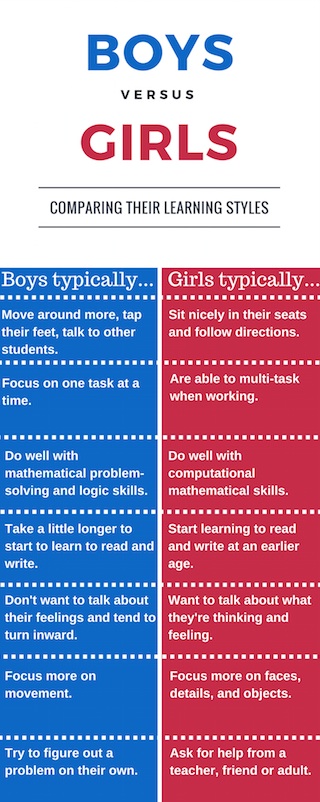
Do Boys and Girls Learn the Same?
Are boys and girls really that different? What do you think of right away when you picture the ‘typical’ little boy or girl?
Picture a kindergarten classroom. As you scan the room you see a bunch of little boys playing with cars, blocks, and maybe even wrestling with each other. On the other hand, the girls are drawing, reading, and maybe role-playing and socializing with each other. Now these are very common generalizations about the ways that boys and girls behave but it is often what we notice. Not all boys and girls portray these characteristics and there are definitely exceptions to each individual. But, science and research has proven that there are reasons why boys and girls behave and learn the way that they do.
How Boy’s Brains Function
Boys do tend to mature slower than girls so they’re often a little behind in language, fine motor skills, and attention. At a younger age, boys struggle more with reading and writing compared to girls but they are stronger in visual processing, analysis, and hands-on related activities. As they get older, the differences are not as noticeable. Boys are also better at focusing on a single task at a time and usually need more space to work. When in the classroom, boys tend to act out or get in more trouble when compared to girls. “Boys are significantly more likely [than girls] to do something dangerous. Risky and dangerous activities trigger a ‘flight or fight’ response that gives a tingle, a charge, an excitement that many boys find irresistible. Boys systematically overestimate their own ability, while girls are way more likely to underestimate their abilities.” (Sax, Leonard. Why Gender Matters. New York: Broadway Books, 2005.)
How Girl’s Brains Function
Studies have shown that girl’s brains develop and process information at a younger age than boys. Therefore, they perform better at reading and writing in their early years. In math and science, girls have a harder time with problem solving as they do with computational problems. Girls tend to have better listening skills, attention to detail, and are more focused at a younger age. Some girls can have confidence issues in school and are inclined to take feedback more personally when compared to boys. They also strive in group settings where they can socially interact with other students. “Bonding to classmates comes easier for girls than for boys, as their greater oxytocin levels make them more socially motivated.” (Campbell, A. Attachment, aggression and affiliation: The role of oxytocin in female social behavior. Biological Psychology, 1-10).
Ways to Help Boys Learn
- Let boys be active. Make sure they have time to move around, run and play with their friends, anything to help get their energy out!
- Encourage reading and writing and be patient! Have books around the house that they are interested in and enjoy reading. Also, don’t put boys down if they’re not picking up on it as fast as you would like.
- Stress the importance of school and education. Research has shown that young boys don’t always see the connection between how school will benefit them and are therefore more
prone to performing poorly and even worse, dropping out. As a parent, make sure to be there for them and encourage them. - Provide manipulatives or hands-on activities. Boys respond best to visuals, especially things they can touch and feel. Having them perform hands-on projects or building something is beneficial at a younger age.
- Make sure to communicate with boys. When boys are stressed, they have a tendency to turn inward and not want to talk about any problems or issues they’re facing. Letting them know that you’re there to help them will make them feel more comfortable and open to talking.
Ways to Help Girls Learn
- Play more hands-on games and puzzles. This will encourage girls to think critically and strengthen their logical thinking skills. Girls can really advance in these areas if started at a young age.
- Verbally inspire girls. As stated above, many girls can have low confidence especially in math and science. By praising them at an early age, you can help to strengthen these skills. Girls typically respond well to verbal feedback.
- Remind girls that they can be anything they want to be! Since girls can lack confidence, it’s a good idea to point out successful women in the world that are leaders and good role models for them.
- Encourage physically activities that involve movement. This will challenge them to step out of their boundaries and comfort zones and to take safe chances in areas such as sports and drama.
- Be aware of loud sounds. Girl’s hearing is more sensitive than boys so watch out for loud noises, yelling, and distractions. This tends to make them more anxious and to lose focus.
Both boys and girls are fully capable of learning the same things but we just need to be aware of the way in which we teach them and what works best for them. Remember, each child is unique so the above tips may not work for every single student.




